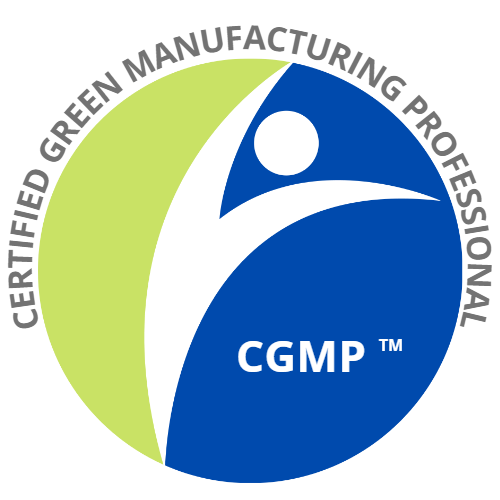
Overview
The CGMP® (Certified Green Manufacturing Professional) is a 3-day course designed to expose participants to the key features and functionality of the environmentally protective lean and green production facility. The course covers practical strategies and techniques towards waste elimination, quality enhancement, and delivery of value to customers—while achieving environmental performance goals. The course contents also provide tools to help your organization get better environmental performance on the shop floor.
CGMP® training will address how to setup, manage and monitor key aspects such as energy efficiency, waste handling etc. to ensure a green manufacturing facility. CGMP® training will also address key operations and maintenance aspects.
CGMP® is the first entry level training in the GCI Green Manufacturing training track. Thereafter, participants can continue on intermediate and advanced level training such as Certified Green Manufacturing Specialist (Energy Efficiency), Certified Green Manufacturing Specialist (Waste) and Certified Green Manufacturing Expert.
Audience Profile
The primary audience for the CGMP® course:
- Manufacturing associates, supervisors, engineers, managers and professionals working in and around the manufacturing facility (representing both end-customers and/or service provider/facilitators) and,
- having the responsibility to achieve and improve energy efficiency and sustainability of the Green Manufacturing Facility, such as manufacturing managers, Operations / Floor / Facility managers,
- Manufacturing engineers and executives,
- Implementation vendors/consultants.
Prerequisites
There is no specific prerequisite for the CGMP® course. However, participants who already have at least one or two years’ experience in a production facility environment may be best suited. Those with no experience just yet are most welcome to participate.
Courseware
Participants will be provided with an English courseware that covers all course information. Depending on country, an additional local translation version of the courseware will be made available at no extra charge. Other languages available are French, Spanish, Bahasa Melayu, Chinese, Japanese and German.
Course Objectives
After completion of the course the participant will be able to:
- design/deploy/manage and monitor environmental and sustainability parameters for a green manufacturing facility
- design/deploy/manage and monitor lean and six sigma essentials in a green manufacturing facility
- design/deploy/manage and monitor environmental wastes in a green manufacturing facility
- design/deploy/manage and monitor energy efficiency technologies in a green manufacturing facility
- design/deploy/manage and monitor green manufacturing policies
- design/deploy/manage and monitor various green manufacturing facility key performance indicators
Course Outline
Module 1: Introduction to Climate Change
In Module 1 – Introduction to Climate Change, you will be introduced to the basic concepts and terminology of climate change. This includes discussions on global warming science, understanding the environmental impact of the manufacturing industry globally, learning how to calculate carbon footprints of an individual as well as the carbon footprint of a manufacturing facility. The module is concluded with a variety of exercises for you to complete.
Module 2: Leveraging Lean and Six Sigma for Sustainability
In Module 2 – Lean and Six Sigma are two powerful business improvement systems that are rapidly being deployed across multiple manufacturing and service sectors. This module is designed to introduce students to these methods. The chapter describes how Lean and Six Sigma relate to the environment and provides guidance on how students can connect with Lean and Six Sigma activities to generate better environmental and operational results. The module is concluded with a variety of exercises for you to complete.
Module 3: Implementing Lean Strategies for Eliminating Environmental Waste
In Module 3: Implementing Lean Strategies for Eliminating Environmental Waste, you will be introduced to practical techniques and strategies that can help students to deliver environmentally protective lean decisions as a routine task of their lean driven business operations. This module prepares the student to work towards organizational efforts to identify and eliminate environmental wastes. As a result, students will learn how to align their organization’s environmental management system’s goals and objectives as a routine task of its lean initiatives and business decisions. Module 3 will help students identify waste in terms of energy, water, and materials use. Identification of these environmental waste reduction opportunities is done through Kaizen events, 6S (5S + Safety), and Value Stream Mapping. The module is concluded with a variety of exercises for you to complete.
Module 4: Implementing Lean Strategies for Energy Efficiency
In Module 4: Implementing Lean Strategies for Energy Efficiency for Green Manufacturing Facilities, you will be introduced to how you can reduce greenhouse gas emissions and energy use while improving performance through Lean manufacturing activities. This module provides practical strategies and techniques for improving energy and environmental performance while achieving Lean goals such as improved quality, reduced waste, and increased customer responsiveness. The module is concluded with a variety of exercises for you to complete.
Module 5: Implementing Lean Strategies for Chemical Wastes
In Module 5: Implementing Lean Strategies for Chemical Wastes you will learn about practical strategies for using Lean manufacturing to reduce chemical wastes while improving the operational and environmental performance of manufacturing and industrial businesses. As used in this course, “chemical waste” refers to any aspect of chemical use and management that does not add value from a customer’s perspective, including excess or unnecessary use of chemicals, use of hazardous chemicals that could harm human health, worker safety, and/or the environment and hazardous wastes generated from production and the disposal of products. The module is concluded with a variety of exercises for you to complete.
Module 6: Implementing Lean Strategies for Water Conservation
In Module 6: Implementing Lean Strategies for Water Conservation, you will be exposed to the plethora of practical strategies for using Lean manufacturing to reduce water use while improving operational performance. Drawing from the experiences and best practices of multiple industry and government partners, this course explores opportunities to identify and eliminate “water waste,” including water losses and leaks, non-value added or inefficient use of water, missed opportunities to reuse water, wastewater discharges, unnecessary water use and risks throughout the supply chain, and missed opportunities to address customers’ water-efficiency goals. The module is concluded with a variety of exercises for you to complete.
Exam Workshop
The exam workshop will be on the last day of the course. This session will help participants prepare for the certification exam through mock questions.
Exam
Certification exams will be administered at the end of the last day of the course. The exam is a one-hour, 40 questions, closed book exam. Results of the exam pass/fail will be communicated to the attendee immediately after the examination. Attendees who pass the exam will receive the official “Certified Green Manufacturing Professional” Certificate. The CGMP® certificate is valid for 2 years, after which attending the updated version of this course or progressing to a higher certification level (Specialist or Expert) and updated exam will be required to maintain the CGMP certification standing.
